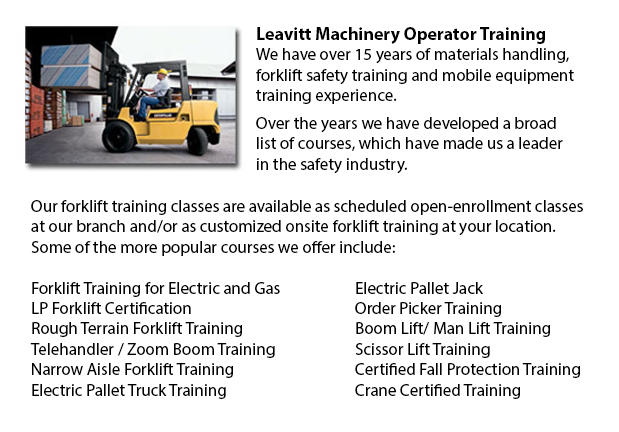
Kamloops Forklift Certification Schools - Forklift Certification is mandatory in North America. Thus, forklift training programs are important both for companies and for individuals searching for jobs in industries as operators of forklifts. Forklift training focuses on health and safety concerns involved in utilizing forklifts. Safety concerns affect both the driver of the forklift and workers and other individuals who are near the forklift. Companies can be subject to penalties if they are caught with drivers who are not certified during an inspection. There are numerous compelling reasons why businesses should comply with forklift standards.
Before the employee or trainee is certified to drive a forklift, most state, provincial and federal regulations would need the worker undergo an evaluation of the skills necessary for forklift safety. There are numerous forklift certification schools providing courses for workers and there are also schools which offer on-line forklift training. Then again, employers should know that forklift certification training is not "just a test". Right forklift training should contain some areas of study, such as theory and hands-on practice. Rules do not require employers to have an outside organization to certify forklift drivers.
A quality forklift certification school will include a recommended curriculum which includes classroom training and hands-on training that is performed on-site. The training sessions within the classroom include videos, power point presentations, discussions and models. Students normally must write a test to check for subject matter understanding. Certificates of completion are given upon successful completion of the class.
The use of the equipment evaluation requires the trainee to understand the job site dangers, pre-operational equipment check, a pass/fail operational test and operational instruction.
The following subject areas will normally be included in the training: Understanding legislations and regulations; Controls & Instrumentation; Engine Operation and Maintenance; Steering and Maneuvering; Visibility, Fork & Attachment Restrictions; Stability, Rated Capacities, Maintenance & Inspection; Load Control; Refueling; Hazardous Locations & Rough Terrain Operations and Pedestrians. What's more, there are training courses available for employees who are transitioning to new job positions.
-
Kamloops Counterbalance Forklift Training
Kamloops Counterbalance Forklift Training - Counterbalance Forklift Training courses are always in high demand. The Counterbalance forklift is a forklift which is made with a weight which counters the balance, equally spreading the weight of the load... More -
Kamloops Manlift Certification
Kamloops Manlift Certification - The Manlifts and Elevated Platforms program offers training on the rules, regulations and proper application of safe operating measures and work practices included in daily activities for people who work making use of... More -
Kamloops Boom Lift Training
Kamloops Boom Lift Training - Elevated work platforms, likewise referred to as aerial platforms, allow workers to carry out tasks at heights that will otherwise be not reachable. There are various styles of lifts designed for different site applicati... More -
Operator Safety Certification | Re-Qualification Certification | In-House Instructor Certification in Kamloops
Forklifts are used in just about all industrial construction sites and in warehouse operations and in boat yards. The reach feature of a lift truck is a vital component used in several applications like for instance when a shelving system is being us... More -
Kamloops Manlift Safety Training
Kamloops Manlift Safety Training - It is essential for competent Manlift operators to be aware of the connected dangers that come with particular kinds of scissor lifts. They must be able to operate the scissor lift in a way that protects not only th... More -
Kamloops Crane Training Schools
Kamloops Crane Training Schools - We have designed several programs for Mobile Crane Operation at our Crane Training Schools. These programs are recommended for the experienced operator who requires certification or re-certification, and for inexperi... More -
Skid Steer Loader Certification in Kamloops
The engine powered skid-steer loader consists of a rigid and small frame, outfitted together with lift arms which could attach to a lot of industrial attachments and tools to perform several labor saving jobs. Typically, skid-steer loaders are four-w... More -
Kamloops Heavy Equipment License
Kamloops Heavy Equipment License - A heavy equipment license could be acquired by taking a certification and preparation course at a private training school or a vocational school. This license would qualify you to operate various types of heavy mach... More

Forklift Certification Kamloops
TOLL FREE: 1-888-254-6157
Kamloops, British Columbia
forkliftcertificationkamloops.com/
Email Us
About Us


